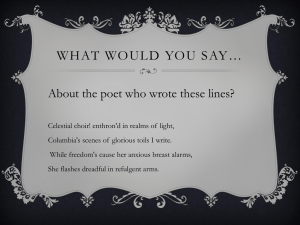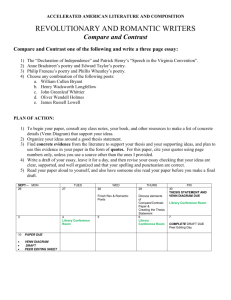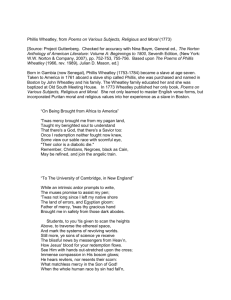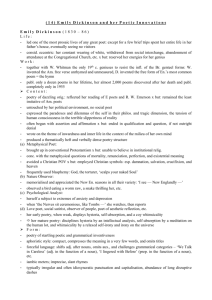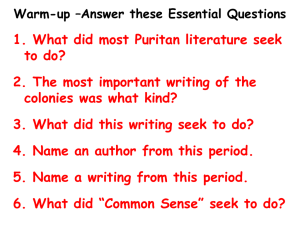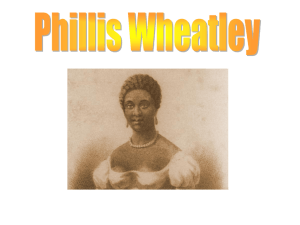Collection 2 Colonial American Poetry Work Packet
advertisement
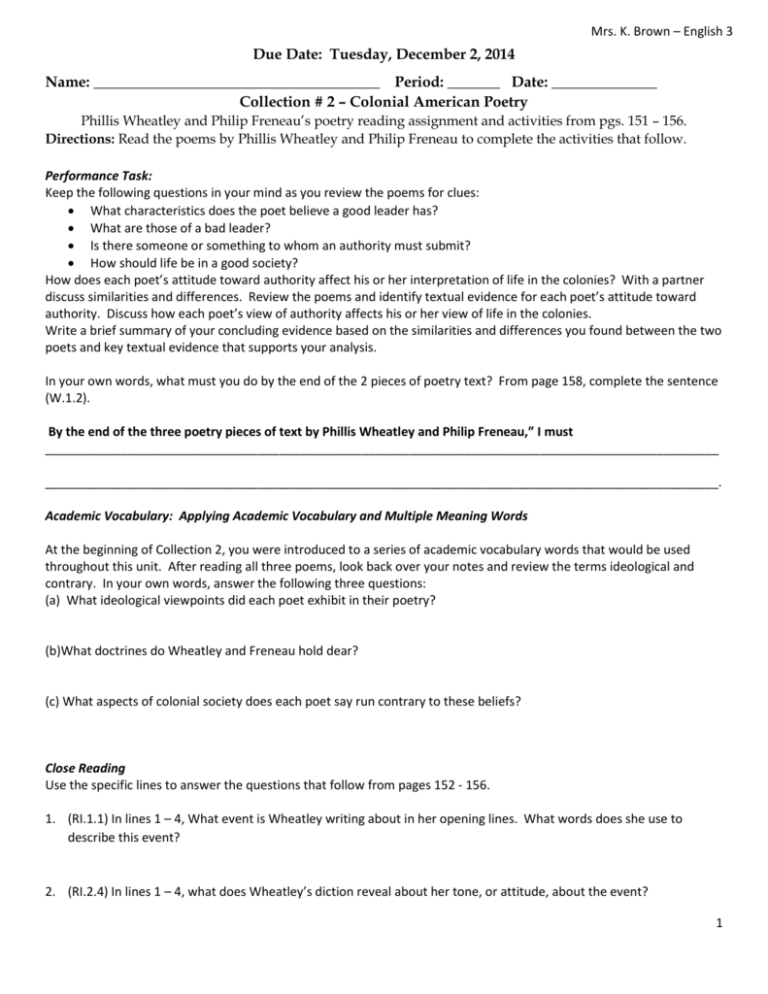
Mrs. K. Brown – English 3 Due Date: Tuesday, December 2, 2014 Name: ______________________________________ Period: _______ Date: ______________ Collection # 2 – Colonial American Poetry Phillis Wheatley and Philip Freneau’s poetry reading assignment and activities from pgs. 151 – 156. Directions: Read the poems by Phillis Wheatley and Philip Freneau to complete the activities that follow. Performance Task: Keep the following questions in your mind as you review the poems for clues: What characteristics does the poet believe a good leader has? What are those of a bad leader? Is there someone or something to whom an authority must submit? How should life be in a good society? How does each poet’s attitude toward authority affect his or her interpretation of life in the colonies? With a partner discuss similarities and differences. Review the poems and identify textual evidence for each poet’s attitude toward authority. Discuss how each poet’s view of authority affects his or her view of life in the colonies. Write a brief summary of your concluding evidence based on the similarities and differences you found between the two poets and key textual evidence that supports your analysis. In your own words, what must you do by the end of the 2 pieces of poetry text? From page 158, complete the sentence (W.1.2). By the end of the three poetry pieces of text by Phillis Wheatley and Philip Freneau,” I must __________________________________________________________________________________________________ __________________________________________________________________________________________________. Academic Vocabulary: Applying Academic Vocabulary and Multiple Meaning Words At the beginning of Collection 2, you were introduced to a series of academic vocabulary words that would be used throughout this unit. After reading all three poems, look back over your notes and review the terms ideological and contrary. In your own words, answer the following three questions: (a) What ideological viewpoints did each poet exhibit in their poetry? (b)What doctrines do Wheatley and Freneau hold dear? (c) What aspects of colonial society does each poet say run contrary to these beliefs? Close Reading Use the specific lines to answer the questions that follow from pages 152 - 156. 1. (RI.1.1) In lines 1 – 4, What event is Wheatley writing about in her opening lines. What words does she use to describe this event? 2. (RI.2.4) In lines 1 – 4, what does Wheatley’s diction reveal about her tone, or attitude, about the event? 1 3. (RI.1.1) Identify the topic of the stanza in lines 15 – 19. 4. (RI.1.2 & 3.9) Cite the words and phrases from lines 15 – 19 that point to the topic and show what the stanza is mostly about. 5. (RL.1.2) What message about life does Wheatley convey in lines 36 – 39? 6. (RI.1.1) Imagery is language that appeals to a reader’s senses, often creating a vivid picture in the reader’s mind. What images, or vivid pictures does Wheatley create in lines 40 – 43? 7. (RI. 2.4) In lines 40 – 43, what images or vivid pictures does Wheatley create? 8. (RI. 1.4) In lines 1 - 4, infer what these lines suggest about the poem’s theme. 9. (RI. 1.2 & 3.9) Reread lines 5 – 8, along with the accompanying footnotes. Cite text evidence from these lines that supports the theme they identified in E above: Things are not always what they seem—things that appear negative may be positive spiritually. 10. (RI. 3.9) In lines 1- 6 on pg. 155, note which words in the first stanza reveal what the newcomer has found and what his new purpose is. 11. (RL.2.5) In line 10, analyze Freneau’s choice of the words “happier soil” and “milder say.” What aesthetic impact do these words have and what image of the new land is Freneau creating? 12. (RI. 2.4) Reread lines 43 – 44. What does his choice of words reveal about his opinion of Europe’s monarchies? 13. (RI.2.5) Cite the words that reveal Freneau’s vision. Summarize what his vision was. 14. What was the overall tone, or attitude, toward America exhibited in each poem? How are the poems tones similar? How do they differ? Cite textual evidence to support your analysis of tone. Analyzing the Text 2 Answer the questions from page 148 below using textual evidence and complete sentences. 1. (RI. 1.1) ___________________________________________________________________________________________ ___________________________________________________________________________________________ ___________________________________________________________________________________________ 2. (RI. 1.2) ___________________________________________________________________________________________ ___________________________________________________________________________________________ ___________________________________________________________________________________________ 3. (RI. 2.4) ___________________________________________________________________________________________ ___________________________________________________________________________________________ ___________________________________________________________________________________________ 4. (RI.2.5) ___________________________________________________________________________________________ ___________________________________________________________________________________________ ___________________________________________________________________________________________ 5. (RI.3.9) ___________________________________________________________________________________________ ___________________________________________________________________________________________ ___________________________________________________________________________________________ 6. (RI. 2.4) ___________________________________________________________________________________________ ___________________________________________________________________________________________ ___________________________________________________________________________________________ 7. (RI. 2.5) ___________________________________________________________________________________________ ___________________________________________________________________________________________ ___________________________________________________________________________________________ Performance Task: Keep the following questions in your mind as you review the poems for clues: What characteristics does the poet believe a good leader has? What are those of a bad leader? Is there someone or something to whom an authority must submit? How should life be in a good society? How does each poet’s attitude toward authority affect his or her interpretation of life in the colonies? With a partner discuss similarities and differences. Review the poems and identify textual evidence for each poet’s attitude toward authority. Discuss how each poet’s view of authority affects his or her view of life in the colonies. Write a brief summary of your concluding evidence based on the similarities and differences you found between the two poets and key textual evidence that supports your analysis. 3

